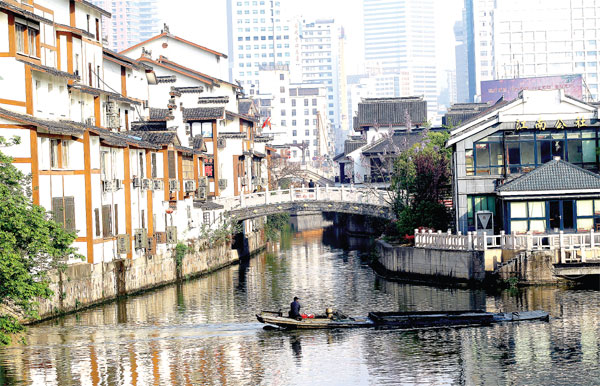Commerce, education blend well in culture
(China Daily) Updated: 2014-09-12 07:42
|
Residences overlooking small bridges and clear rivers - a typical scene of a Yangtze Delta town. Now in Wuxi, they have high modern buildings in the background. |
Industrious, flexible traits allow city to prosper as business hub
In recent years, there's been a quiet revival of interest in the Yangtze River Delta that covers cities like Wuxi, Shanghai and Suzhou.
It is a Chinese subculture named after the Wu kingdom in this area of the Spring and Autumn period (770-476BC). It is the old tradition that has shaped the local people's industrious and flexible traits.
"Our culture laid a foundation for Wuxi's rise and lasting prosperity for 3,000 years," said Zhuang Ruojiang, professor of Wu Culture at Wuxi-based Jiangnan University.
In the face of wars, people from the more civilized north and west of China fled to Wuxi three times in the past 3,000 years. Interestingly, the newcomers, outnumbering locals by a large margin, did not change the local culture. Instead, they assimilated quickly, enjoying the worry-free life.
The second wave of new immigrants, in the late Tang Dynasty (618-907), provided enough laborers to turn the wildland into fertile farmland, raise silkworms and fish. Wuxi quickly became a land of milk and honey.
A saying came into the Chinese language after the Tang Dynasty: "The harvest around Taihu Lake guarantees enough grains for the whole nation to eat throughout the year".
Agricultural technology improved remarkably in the Song Dynasty (960-1279) and Ming Dynasty (1368-1644), producing surplus laborers for the development of commerce and industry in Wuxi and neighboring regions, which boomed from the late Qing Dynasty (1644-1911) until the present.
- Govt encourages people to work 4.5 days a week
- Action to be taken as HIV cases among students rise
- Debate grows over reproductive rights
- Country's first bishop ordained in 3 years
- China builds Tibetan Buddhism academy in Chengdu
- Authorities require reporting of HIV infections at schools
- Typhoon Soudelor kills 14 in East China
- Police crack down on overseas gambling site
- Debate over death penalty for child traffickers goes on
- Beijing to tighten mail security for war anniversary








